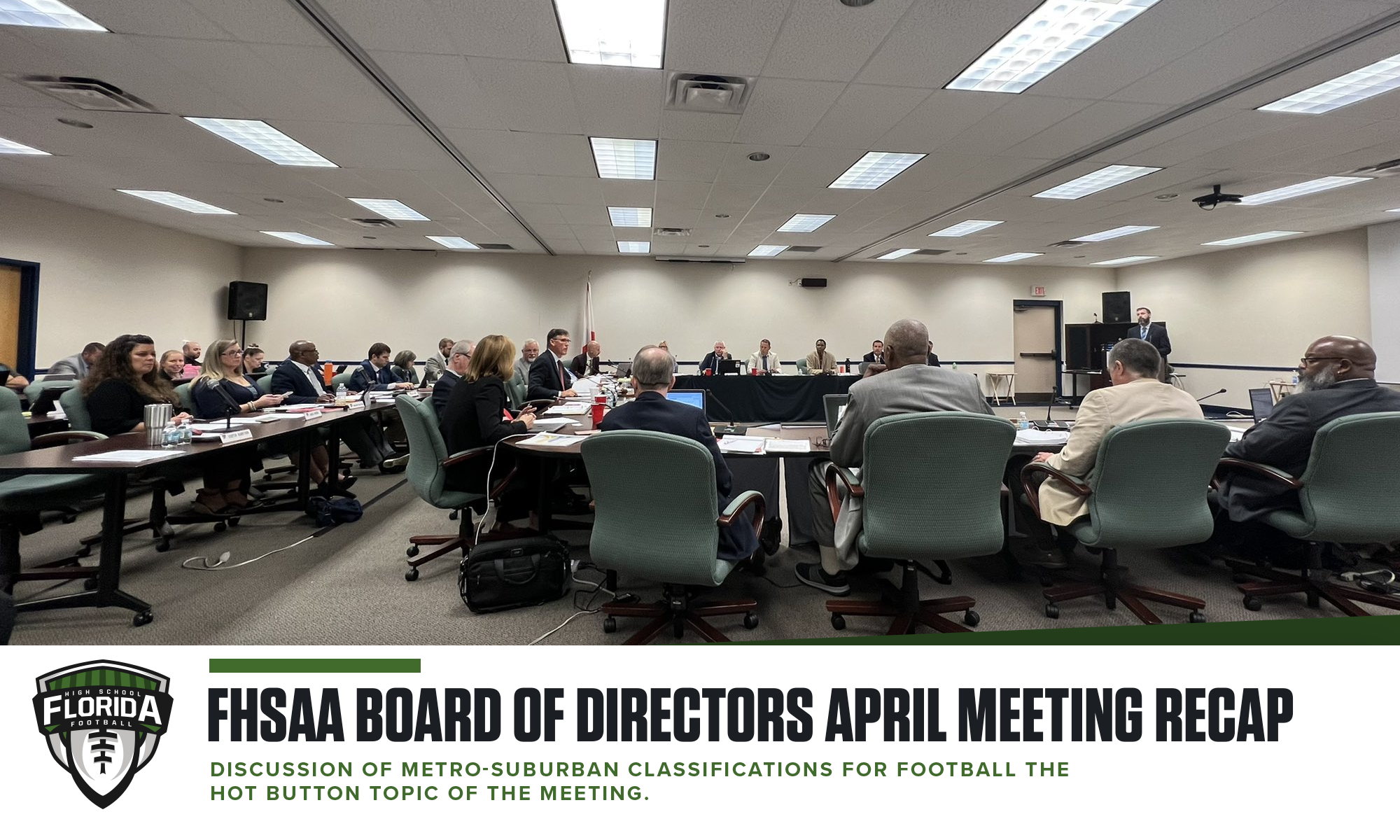GAINESVILLE, Fla. – The Florida High School Athletic Association’s Board of Directors met for the fourth time in the 2021-22 school year at the association’s headquarters were a variety of topics were discussed and acted on impacting both tackle football and girls flag football.
However, the biggest topic of the day was further discussion with additional actions being asked to be taken on the Metro-Suburban classification policy.
METRO-SUBURBAN CLASSIFICATION POLICY REVISITED
After February’s 9-7 vote that passed the Metro-Suburban classification policy, board member Ralph Arza who serves the board as one of the Citizens At-Large as appointed to the FHSAA Board of Directors by the Florida Department of Education asked for a discussion and action on Policy 12.
Representatives from Miami-Dade, Broward and Palm Beach counties making up the tri-county area of South Florida that has been the vocal against the policy change to the Metro-Suburban classifications in football were in attendance and spoke vehemently against the entire policy.
A delegation of coaches and athletic directors representing Miami-Dade, Broward and Palm Beach Counties all showed up asking the Board of Directors to pause, review and reconsider the decision of the Metro/Suburban classification.
Reginald Fox, Administrative Director of School Operations for the Greater Miami Athletic Conference (GMAC) which is under Miami-Dade County Public Schools spoke that the concept was flawed in nature as the concept was born out of statistics. He says they are flaws that created the foundation for the concept citing that 89% of state championships have come from the eight metropolitan counties.
Fox further elaborated in his view that the misuse of statistics leads to a flawed concept and is setting a precedent for dividing the state. He is saying that a divided house cannot stand when asking for a pause and a review.
LaToya Williams, Executive Secretary for the GMAC; Daryle Heidelburg, head coach at Miami Norland and a representative of Section 4 on the Football Advisory Committee; Tommy Caporale head coach at Miami Dr. Krop; and Shawn Carney, Athletic Director at Miami Killian all spoke similar sentiments that Fox had during the public comments expressing for a pause, review, and reconsideration of Metro-Suburban.
Valerie Miyares, District Athletics Manager for Palm Beach County Schools is said there is no support for the Metro-Suburban policy from her 24 high schools in her school district as well as the district superintendent who she was speaking on behalf of as well.
Miyares cited that diversity is mostly concentrated in metropolitan areas saying that most Title I schools are in metropolitan areas while saying that there are Title IX issues as football now has two pathways to a state championship which no girls’ sports have that advantage.
Shelton Crews of the Florida Athletic Coaches Association spoke regarding that classification was something that needed to have happened with discussion in September and any approvals by the Board of Directors in November and not still being discussed now on the first day of spring football.
Crews further went on saying that regarding that if the issues in Policy 12 are not fixed regarding how students are counted it won’t matter what model for classifications is used while speaking in regards to transfers being an issue that is directly tied back to the concerns some have had around school choice.
Crews then reminded the board that he asked for a classification committee three years ago and is still standing by that to look at the things regarding classification for the future.
Shawn Cerra, Director of Athletics and Student Activities for the Broward County School District, representing the Broward County Athletic Association (BCAA), cited support for a pause and have things revisited as he had 46 signatures in hand supporting what he was asking for.
The BCAA represents all public schools in Broward County as well Coral Spring Charter School, Pembroke Pines Charter School, Fort Lauderdale St. Thomas Aquinas, and Fort Lauderdale Cardinal Gibbons.
Arza went on to discuss why he brought this back to the board after the public comments to say that while he still supported the Metro-Suburban concept, he cited Heidelburg’s comments regarding that he thought he was voting on a concept, not an action item through the Football Advisory Committee as a concern. Arza further elaborated saying that most of South Florida had not been heard and had based his assumption for voting on the matter that his area had supported given the Football Advisory’s Committee 9-0 vote back on January 5, thus asking for a one-year pause on implementing.
With that Arza put a motion on the floor for the one-year pause which opened up discussion among the board ranging from those still not in support of the Metro-Suburban policy to those reminding the rest of the board that they said they would support the FHSAA Staff in how the policy was officially shaped and crafted into policy while other cited schedules, homecomings, and venues had already been set for the upcoming season.
Richard Finlayson of Aucilla Christian spoke and reminded the Board of Directors about good governance and reminded the board that they all supported the staff to craft the Metro-Suburban policy. He also stated that going backward would be worse for the association going forward and that it would not be good for the health of the association if they reversed the decision made in February.
In the end, the motion failed 5 to 11 keeping the February vote for Metro-Suburban in place for the 2022 and 2023 seasons.
Board Members That Voted Yes:
Arza
Gabriel
Oliva
Patricca
SmithBoard Members That Voted No:
Dodd
Finlayson
Forson
Forsyth Abney
Gerdes
Kenna
Longshore
Marello
McLean
Thomas
Ward— FloridaHSFootball.com (@FlaHSFootball) April 25, 2022
In following up with Arza after the meeting he felt things were not looked at fairly for the Metro-Suburban policy.
“I just felt that the information that was put before us did not include a fair representation of South Florida,” Arza stated.
He further elaborated that maybe the composition of the sports advisory committees, as well as the Board of Directors, needs to be looked at and get more consideration from all areas around the state otherwise he feels the FHSAA could be in peril and which see school split to go to other potential associations.
REGIONAL PLAYOFF RESEEDING TO OCCUR
In an article we first brought you on Friday, the Board of Directors approved 16-0 a policy change that will now seed teams No. 1-No. 8 by the FHSAA Power Rankings that are generated by MaxPreps while only guaranteeing district champions an entry into the regional bracket, but not guaranteed a home game.
In the previous years, district champions have been seeded No. 1-No. 4 first while at-large teams were seeded No. 5-No. 8. In this situation, a district champion would have been guaranteed a home game in at least the first round of the playoffs.
Back to the Regional Reseeding… The Board has voted 16-0 to start seeding teams 1-8 regionally meaning a district champion could get seeded 5-8, but if a district champion is seeded against an at-large team in the first round of the playoffs, the district champion will host.
— FloridaHSFootball.com (@FlaHSFootball) April 25, 2022
However, the Operations Committee on Sunday modified the language slightly to read that while the teams will be seeded by the FHSAA Power Rankings first, if a district champion were to go up against an at-large team in the first round of the playoffs, they would be guaranteed to host regardless of their seed number.
As for two district champions meeting in the first round? The higher seeded district champion would host the first-round game under that caveat while if an at-large team faces another at-large team in the first round, the higher-seeded team of the two at-large teams would host.
Furthermore, if two district champions are seeded to meet in the first round, the higher-seeded district champion would host that first round. After the first round, the higher seed would host regardless if they are a district champion or not.
This goes for all team sports.
— FloridaHSFootball.com (@FlaHSFootball) April 25, 2022
The action takes effect starting for the 2022-23 school year.
TICKETING POLICY OF POLICY 9.8.1.1
Some concerns regarding the ticket service system were raised after an unexpected jump in cost the FHSAA incurs in the costs per ticket for FHSAA events has been seen this school year that was brought up by board member Chris Patricca of Lee County.
FHSAA has a current contract with GoFan which they require schools to use during district and regional events.
The recommendation is to look for a competitive bid in the future regarding digital ticketing services after the current service provided raised the costs without warning on the costs of tickets as brought up by board member Chris Patricca of Lee County.
SEATING REQUIREMENTS FOR FOOTBALL IN POLICY 14.3.2.11
Board member Patricca raised questions from the Finance Committee regarding seating capacity and changed it to a minimum capacity instead of including the word seating and seats as some fans at football games don’t sit in seats but instead who might stand along the fence line.
The motion passed the board unanimously to strike the words and to approve the following seating capacities for football:
Class 4M and Class 4S – 2,500-person capacity
Class 3M and Class 3S – 1,500-person capacity
Class 2M and Class 2S – 1,000-person capacity
Class 1M, Class 1R, and Class 1S – 500-person capacity
The capacities that will be a part of 14.3.2.11 for football will be as followed:
Class 4M & Class 4S – 2,500-person capacity
Class 3M & Class 3S – 1,500-person capacity
Class 2M & Class 2S – 1,000-person capacity
Class 1M, Class 1R, & Class 1S – 500 person capacity#flhsfb— FloridaHSFootball.com (@FlaHSFootball) April 25, 2022
The next FHSAA Board of Directors meeting is set for Tuesday, June 7 at the FHSAA headquarters in Gainesville.









